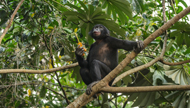The bonobo - protecting forests, creating jobs

War has devastated several forest areas in the Democratic Republic of Congo, literally emptying them of species. The country's lush green cover is also shrinking due to deforestation, fires and the push for new farming land. Lake Tumba is however trying to reverse the trend and key to its efforts are bonobos, an endangered great ape. So far, the animals were able to survive thanks to the religious beliefs of local inhabitants that prohibited them from hunting the apes. In future, the creatures are meant to help communities earn a livelihood. A group of bonobos has been trained to get used to humans and that could be a first step to future tourism in the area. In return, local communities are also ensuring that the forest in the area is managed sustainably and fighting invasive species. It's hoped the measures will help rejuvenate the forest around Lake Tumba and turn it into an intact ecosystem once again.
A film by Jürgen Schneider; Picture: Bonobo on a tree. © Matthias Dehling / WWF
The link has been copied to the clipboard
Information
Length
07:03 Minutes
Date of publication
2014
Project
Global Ideas

Related Publications
Further publications related to the International Climate Initiative and its projects can be found in the publications section of our website.




